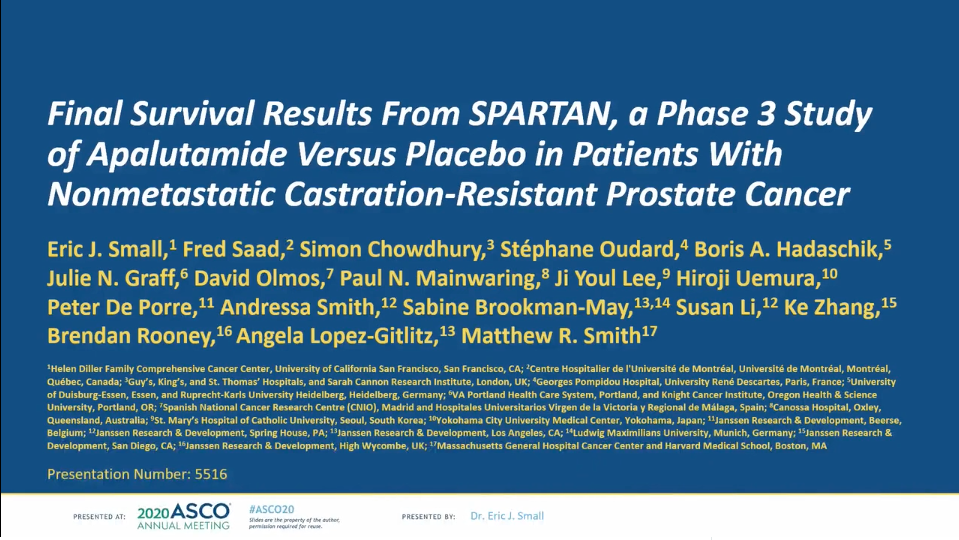Dr Charles M. Rudin (Memorial Sloan Kettering Cancer Center, USA) presented the findings [1]. The KEYNOTE-604 study aimed to improve upon the efficacy of immunotherapy in newly diagnosed ES-SCLC with the combination of pembrolizumab and EP.
The study randomised 453 patients to pembrolizumab 220 mg on day 1 plus EP 100 mg/m2 on days 1 and 2 and carboplatin AUC 5 on day 1 or cisplatin 75 mg/m2 on day 1 (n=228) or placebo, matching EP, and carboplatin or cisplatin (n=225) for up to 31 cycles. The co-primary endpoints were PFS per RECIST v1.1 by blinded independent central review and OS. Secondary endpoints were overall response rate (ORR) and duration of response (DOR) per RECIST v1.1 by independent review, as well as safety.
The final PFS analysis was significant (4.8 vs 4.3 months; HR 0.73; 95% CI 0.60-0.88). The 12-month PFS rate observed with the pembrolizumab combination was 15.9% versus 5.0% with the placebo combination. Even at 18 months, the PFS rate in the pembrolizumab arm was higher than the placebo arm at 10.8% versus 2.1%. In terms of OS, pembrolizumab/EP prolonged OS compared with the control combination (10.8 vs 9.7 months; HR 0.80; 95% CI 0.64-0.98; P=0.0164), but it did not reach the superiority threshold, which was P≤0.0128. The 12-month OS rate was 45.1% in the pembrolizumab arm compared with 39.6% in the placebo arm. At 24 months, the OS rate was 22.5% in the pembrolizumab arm compared with 11.2% in the placebo arm.
The safety analysis showed that adverse events (AEs) of any-grade occurred in 100% of patients in the pembrolizumab arm and 99.6% of patients in the placebo arm, in the as-treated population. AEs were grade 3/4 in 76.7% of subjects who received pembrolizumab/EP compared with 74.9% of those who received the placebo combination. Grade 5 AEs/death occurred in 6.3% of patients in the pembrolizumab arm versus 5.4% in the control arm.
Placing these results in context, other trials looking at immunotherapy in this setting like the phase 3 IMpower 133 study, as well as the CASPIAN trial, significantly improved OS compared with EP alone. However, both of these other trials provided stronger responses, raising the question of whether there may be a distinction in targeting PD-L1 as opposed to PD-1.
- Rudin CM, et al. ASCO Virtual Meeting, 29-31 May 2020, Abstract 9001.
Posted on
Previous Article
« Second-line gemcitabine plus ramucirumab significantly improves overall survival Next Article
TAVR safe and effective in low-risk bicuspid aortic stenosis patients »
« Second-line gemcitabine plus ramucirumab significantly improves overall survival Next Article
TAVR safe and effective in low-risk bicuspid aortic stenosis patients »
Table of Contents: ASCO 2020
Featured articles
COVID-19 & Telemedicine
COVID-19 and Cancer Consortium Registry: initial results
Oncology hospital-at-home model reduces hospitalizations, emergency department visits, and costs
Nurse-led telephone triage system reduces hospitalizations, helps patients manage symptoms at home
Melanoma
Adjuvant pembrolizumab: durable RFS for stage III melanoma
Adjuvant pembrolizumab: durable RFS for stage III melanoma
Pembrolizumab plus low-dose ipilimumab well tolerated after progression on PD1 antibody therapy
Toripalimab plus axitinib effective in metastatic mucosal melanoma
Breast & Ovarian Cancer
Advanced breast cancer: locoregional therapy does not improve OS
T-DM1 does not improve safety or efficacy in HER-2 positive early breast cancer; favorable iDFS reported
Maintenance olaparib improves OS in relapsed ovarian cancer with BRCA1/2 mutation
Combination pembrolizumab/chemo improves PFS in metastatic TNBC
Effect of veliparib with or without cisplatin in breast cancer: results of SWOG S1416
PHOEBE, a phase 3 trial comparing pyrotinib and lapatinib in HER2-positive metastatic breast cancer
BYLieve demonstrates efficacy of PIK3CA-directed treatment post CDK4/6-ihibition
Strategies emerge for chemotherapy de-escalation in HER2-positive breast cancer
Multiple Myeloma
Carfilzomib: no PFS benefit for multiple myeloma
Lung Cancer
ES-SCLC: tremelimumab + durvalumab + chemotherapy misses endpoint
Adjuvant osimertinib in NSCLC: practice changing ADAURA trial
ES-SCLC: pembrolizumab KEYNOTE-604 data
Second-line gemcitabine plus ramucirumab significantly improves overall survival
Tiragolumab and atezolizumab: ORR in NSCLC
MET-amplified advanced NSCLC responds well to MET inhibitor capmatinib
Genitourinary Cancer
Urothelial cancer: avelumab works as maintenance therapy
ARAMIS final OS and nmCRPC safety outcomes
Final survival results from phase 3 SPARTAN trial
Novel drug for kidney cancers/VHL patients
Primary analysis from IMvigor010, adjuvant atezolizumab in high risk muscle-invasive urothelial carcinoma
First randomised trial of Lu-PSMA in mCRPC progressing after docetaxel
Gastrointestinal Cancer
HER2-expressing metastatic colorectal cancer: trastuzumab deruxtecan
REGOMUNE: a phase 2 study combining regorafenib and avelumab
Cardiotoxicity: consider switching to S-1
Perioperative chemotherapy for resectable pancreatic ductal adenocarcinoma
Real-world data of sequential sorafenib followed by regorafenib in unresectable HCC
Paediatric Cancer
Sustained improvements in quality of life with larotrectinib
Promising first immunotherapy trial in placental trophoblastic tumours
Precision medicine for poor-prognosis paediatric patients
Related Articles

September 17, 2020
Urothelial cancer: avelumab works as maintenance therapy

September 17, 2020
Final survival results from phase 3 SPARTAN trial
© 2024 Medicom Medical Publishers. All rights reserved. Terms and Conditions | Privacy Policy
HEAD OFFICE
Laarderhoogtweg 25
1101 EB Amsterdam
The Netherlands
T: +31 85 4012 560
E: publishers@medicom-publishers.com

